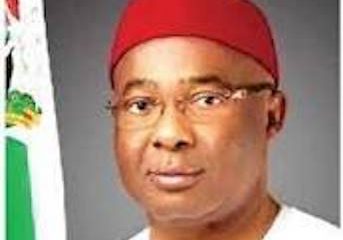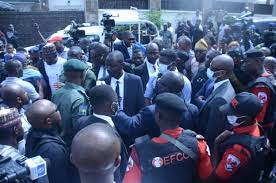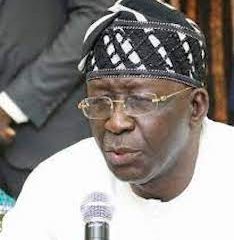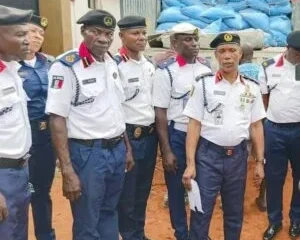COLUMNISTS
The State and the Train Hostages

By Dakuku Peterside
It is no longer surprising that Nigerians hear or read about insecurity in various parts of the country. We have become so narcotised and insensitive to the news of insecurity that when kidnappings, bombings or attacks on villagers by bandits, terrorists, or other non-state actors happen, unless people are killed, maimed, or taken hostage in their hundreds, it hardly makes news; and if at all it does, it will be back burner or minor news with little significance.
Neither does it shock us nor cause moral panic, as it did in the past. These days, we have priced insecurity into our daily lives that it is almost becoming uncommonly common.
Nigerian citizens have no place to hide, and they have no actors to look up to for protection and solace.
The state seems to have failed in its primary responsibility of protecting the lives and properties of the Nigerian people, and worse still, we live in limbo without any hope. Bandits and terrorists attack at will, destroy lives and properties, and cart away unlucky victims into exile, with little or no consequences.
People are resorting to self-help to protect themselves and their loved ones, and gradually Nigeria is snowballing into a Hobbesian state of war, and of every man against every man. Events prove that we are on a precipice, waiting for a slight push into the abyss, each passing day. It is frightening that those whose responsibility it is to salvage the situation are playing Russian Roulette with our collective existence.
It has been a slippery slope to damnation. Nothing much has changed, from the kidnapping of Chibok girls that shocked the world to the recent attack on the Abuja-Kaduna train. The Nigerian state has not risen to its responsibility of protecting and defending its citizens. Some of the Chibok girls are still in captivity, and so are some other victims of heinous crimes against humanity, with no definite action from the Nigerian state.
It is deplorable that 35 days after the terrible train incident, over 168 persons, including pregnant women, who were abducted, and their families, are still crying for action from the state to help release the victims and bring justice to the perpetrators. The train hostages are not the first and may not be the last set of hostages, which presents the Nigerian state as helpless and hapless in combating insecurity within its territory.
Statistics reveal the growing trend in kidnapping since 2013 and ranks Nigeria among the top five countries known for kidnapping for ransom. In analysing data collected through the Nigeria Security Tracker (NST) between 2015 and June 2021, HumAngle observed a growing trend in the number of mass abductions and the total number of victims of kidnapping in Nigeria. While in 2017 there were 484 kidnap victims, the figure grew to 987 the following year, then 1,386 in 2019 and 2,860 in 2020.
Between January 1 and June 30, 2021, at least 2,944 people had already been kidnapped — making 2021 the worst year yet on the basis of this security index. These number will be higher if communities along the border areas in Cameroon, Chad, and the Niger Republic are considered. We can easily speculate that data for 2022 will even be worse than 2021.
Furthermore, political induced conflict , citizen alienation, terrorism and violence define the Nigerian insecurity scene. According to the Global Peace Index, Nigeria is included among the countries with the least peace globally, and it is the 17th unpeaceful state in the world.
Besides, the Global Terrorism Index reports that Nigeria is the third country most affected by terrorism. Same report says there is a substantial risk of mass killing or genocide in Nigeria, and Nigeria is the second country in Africa with the highest risk of genocide and the sixth worldwide.
This risk is influenced by over two hundred million people, a high child mortality rate, ongoing battle-related deaths, a history of mass killing, and ethnic agitation “.
These disturbing facts are apparent, yet we do not see serious actions from the state to change the narrative and stem the decent to anarchy we are witnessing daily. Nigeria seems to have failed its citizens and is watching while insecurity becomes a permanent feature of our country. Nigerians are screaming for more effective and efficient tangible actions to radically reduce or eliminate our land’s insecurity.
In a recent statement, John Campbell, a former US Ambassador to Nigeria, notes that the inability of the Nigerian government to keep its citizens safe and secure is one of the signs of a weak or a failing state. The state’s inability to defend citizens against robbery, natural adversity, and economic vagaries is a symptom of failure, and worst is its failure to protect its citizens from non-state actors from within and outside the country.
Going by Ambassador Campbell’s statement and other definitions of failure of the state in its responsibility to citizens, the question to ask is, has the Nigerian state failed its 168 citizens kidnapped in the last 35 days ago?
To these 168 Nigerians, “Nigeria has happened to them” – a statement that characterises the rising hopelessness and an uncanny acceptance that Nigeria connotes terrible things, and when it happens to you, it is the worst thing you can face.
“Nigeria has happened” to one of the kidnapped women who had the unfortunate situation of having her baby in a dungeon amidst terrorists and kidnappers. What a way to enter the world for the new baby!
This incident makes a mockery of the many excuses of the state. The terrorists and kidnappers brought doctors and medical supplies into the forest to get the baby delivered. Yet our security operatives have not managed to fish them out. The kidnappers successfully managed labour delivery, contacted the family, broke the delivery’s news, and sent photos of the new baby to the woman’s family and the world.
Where are our intelligence operatives with all these happening? If the kidnappers interact within the community, why can’t the intelligence operative track them through those means? The state must take this issue of insecurity more serious than it does now.
The minister of Information, Lai Mohammed, claims that the state’s actions to release the kidnapped victims are confidential. He expects Nigerians to trust the government and believe that the victims will be released soon. But history is not kind to such expectations. Similar past events have shown that such hope in the government may be misguided. “Once beaten, twice shy”.
The average Nigerian citizen has expectations of the government – that it will secure citizens’ lives and properties in most cases. This expectation aligns with all citizens’ social contract with the state and expects the state to abide by that creed. The situations where non-state actors cross boundaries and attack unarmed civilians in their villages are unacceptable.
Similarly, when citizens going about their regular businesses are terrorised and kidnapped by internal non-state actors, and 35 days later, nothing meaningful seems to have been done by the state is against decency and good taste.
Nigerians have the right to demand security and safety of their lives and property, and the state must act quickly to fulfil that. Erosion of trust in the state to protect citizens will lead to anarchy and mayhem.
The international community has expectations of the government too. It expects the government to maintain and protect its territorial integrity and monopolise control of all instruments of coercion within its territory.
Nigeria is a regional power and has a history of keeping regional peace in the sub- Saharan region. This history earned it the respect of the world in the past. How the giant of Africa faltered to the point that non-state actors are constantly challenging and sometimes out-manoeuvring it beggars belief.
Security-wise, Nigeria is almost becoming the butt of jokes among countries within the region who hitherto rely on it for security. This anomaly must be contained very quickly. The Nigerian state has no business competing for control of territory with non-state actors, and where this is the case, it must do whatever it takes to restore its control over all its parts and deal decisively with all forms of local banditry, terrorism, and secessionist rebellion with its might.
Nigerians and the international community have been expecting this for a long time, and this is the time to make it happen. The pertinent question here is, how can Nigeria solve the insecurity crises facing it?
Among the many apparent solutions to the problem of insecurity is the most practical one – the state must rein in its security forces and give them everything they need to succeed. It is crucial to empower the security forces and provide them with the mandate with clear deadlines to wipe out bandits and insurgents. Adopting effective kinetics and non-kinetic approaches in tackling criminals will improve the situation. This is time for action and not statements or declarations.
The state should optimise intelligence and involve the people in intelligence gathering. By the way, the bandits are humans and live and interact within communities. Good intelligence gathering will help the security forces efficiently deal with insurgencies, including banditry and kidnappings.
The insurmountable nature of insecurity in Nigeria is heart-breaking. It is time for a change in thinking in tackling insecurity. There is no sense in doing the same thing repeatedly that gives the same results. We need to change tactics and resolve to deal a decisive blow to non-state actors terrorising the citizens and our way of life. We should start with the perpetrators of the train bombing last month.
Government must make it a duty that it owes Nigerians and the victims of the train terror attack to rescue the 168 victims of the ordeal, plus the new baby, and bring to justice, the criminals who committed the crime. It is now or never!
Dakuku Peterside is a policy and leadership expert.
COLUMNISTS
The Emefiele Mess and Rivers State’s Comedy of Errors
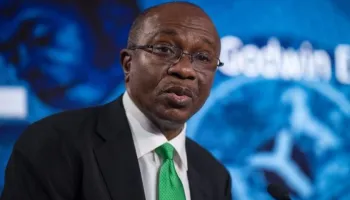
By Zainab Suleiman Okino
The former Governor of Central Bank of Nigeria, Godwin Emefiele finally got a respite last Friday when he was released from Kuje prison after meeting his bail conditions, but not before his alleged atrocious and unfathomable heists were made public, to his eternal disgrace.
Emefiele was arrested by the Tinubu-led government and spent 195 days in detention, while investigations into his tenure at the apex bank were ongoing.
Although the media decried his and the former EFCC chairman, Abdulrasheed Bawa’s long detentions without trial, in line with the country’s laws, by the time his trial commenced, it had become obvious that we had a juvenile-like man in charge of the trillion-dollar economy of Nigeria.It is therefore not a surprise that the economy also collapsed and all he could do was to encourage a figure-head President Buhari to borrow and borrow more.
Back to the shocking revelations shaking the fabric of the Nigeria society, Emefiele, according to the special investigator, Jim Obazee, operated 593 illegal US, UK, and China accounts and diverted £543,482, 213 into UK banks alone, in addition to his trial over N1.2 billion procurement frauds.
There are also allegations that Emefiele sold or “gave away” Union Bank, Keystone Bank and Polaris Bank to proxies and cronies in the guise of being special purpose vehicles (SPVs) for acquisition after CBN’s no objection report, which he had orchestrated.
Emefiele’s sins are many and the coming days will reveal the Tinubu-led government’s readiness to handle corruption-related issues concerning the ex-CBN governor, other key players in the previous administration, and anybody for that matter, and that includes those associated with him.
Emefiele, fresh out of prison, has sought for the further investigation of the shady deals he was accused of, while claiming that the accusations against him “are false, misleading and calculated to disparage my person and injure my character.” I hope so too and wish Emefiele good luck, because only a person with mental disorder would commit such malfeasances and hope not to be held accountable for them.
By far, the most damaging of Emefiele’s obnoxious policies was that of the naira redesign, which assumed a political dimension allegedly to stop Tinubu from emerging as president, but nonetheless had devastating consequences on ordinary Nigerians, leading to deaths and the crippling of people’s finances.
To think that the idea emanated from a former presidential aide and relation of President Muhammadu Buhari, is to take Emefiele’s loyalty to the Buhari cabal to a ridiculous extent. What exactly did Emefiele want? As a former MD/CEO of Zenith Bank before his appointment to the apex bank by ex-President Goodluck Jonathan, he should have felt accomplished enough not to allow his ambition, greed, and pressures from the cabal (no matter how powerful they are) to sway him towards unethical deeds, with far-reaching consequences on his reputation.
Again, Emefiele is fighting back, claiming he had presidential approval for the naira redesign, and that he neither operated 596 accounts, nor withdrew $6.23 million alongside former SGF Boss Mustapha. Whatever!
He was perceived as having his two hands in the national cookie jar, while the Nigerian people reeled in poverty. His disastrous political voyage did not help matters. Emefiele’s alleged financial sleaze and fleecing of the country was unprecedented and the most brazen in recent times.
But instead of being cautioned, he was encouraged by other officials of the Buhari government in an unholy alliance that only the ex-CBN governor is now paying for. With his experience in one of the biggest banks in the country, why he allowed non-professionals in government to drag him into the pit is incomprehensible.
Does it really mean there is no limit to the official corruption of top government functionaries or because the Nigerian public also condones it and collects peanuts to become their cheerleaders? So, the joke is on us as a people, if there are no mechanisms to stop financial recklessness in high places before they get to an outrageous level like that of Emefiele.
Running for the office of the president was Emefiele’s greatest undoing and the height of impunity. For this brazen arrogance, it was obvious that losing out would also lead to his waterloo. Was becoming president calculated to protect his loot and turf? To whose detriment? To prove his immunity from prosecution or that he was untouchable? If he had transmuted to the president of Nigeria, he would have made history, running for election as a sitting CBN governor, when he was supposed to be non-partisan.
That thoughtless action would have finally nailed Nigeria as a banana Republic, with far-reaching implications for the country’s image and its people. It would have also meant the diminished integrity of the country’s number one financial institution, which would have become a cash cow for his relentless financial laundering; another form of state capture, whereby corporate governance, leadership capability and personal morals are near zero. Surely Emefiele needs to do a lot to clear his name and extricate himself from the rot that happened under his leadership.
Rivers State Comedy of Errors
When last week President Bola Tinubu invited the warring personalities in the Rivers State political crisis – Governor Siminalayi Fubura and ex-governor and Minister of the FCT, Nyesom Wike – to the Presidential Villa for a truce, little did we know that instead of a thaw, the crisis would spiral into ridiculous confusions, drama, and intrigues.
However, as things stand today, only ex-Governor Nyesom Wike seems triumphant, but will his laughter last long? With President Tinubu behind him, the answer is in the affirmative. However, will Governor Fubura and the people of Rivers State live with the idea of being governed from Abuja? The reactions from River State stakeholders and interest groups so far reveal otherwise. They were mistaken to think the president meant well by the time the details of the ‘negotiation’ began to unravel.
The president neither reprimanded the 27 lawmakers who had defected to his party (APC), nor asked all parties to return to status quo ante, which would have ensured they remain in their party, dropped the impeachment of the governor idea and withdrew the legal cases against the lawmakers from the court.
As impossible as this may appear, it was the closest to a peace deal for all. But that did not happen. Instead, the president was silent on the defection. Some other details have since emerged indicating that it was a win-win deal for the strongman and minister, Wike, now in the inner recesses of the power loop of the Tinubu government.
If the PDP/Fubura drops the case of defection against the 27 lawmakers now in APC, how can the governor sleep with his two eyes closed when his impeachment can be organised and executed within an hour? So, where is the governor’s armor or shield against the unexpected? Again, many legal luminaries like Femi Falana and Chief Robert Clarke have condemned the unconstitutionality of Tinubu’s intervention and therefore it cannot hold water. As such, where do we go from here and what transpired?
A member of the Rivers Elders Forum and delegation to the Villa, Chief David Briggs, in an interview described the reconciliation effort as akin to a trick and the imposition of a one-sided resolution. “That was not a meeting. Mr President walked in with a written resolution, addressed us, and declared that what he had in his hand is a presidential proclamation.
He emphasised the fact that he is the president of the Federal Republic of Nigeria, and anybody who tends to say no to what he is saying, it has consequences. Tinubu in a simple layman’s word is a threat. He wrote the resolution but refused to read it. He handed the resolution to Dr Peter Odili to read it.”
I’m not sure Tinubu would have accepted this kind of resolution from President Obasanjo during his crises-ridden governorship with his two deputies at various times, yet that is the bitter pill Fubara is expected to swallow to avoid being impeached and to make Wike feel good.
That Rivers stakeholders are now speaking is a natural consequence of the comedy of error unfolding in their state. If the Fubara-Wike rift continues and political divides deepen, the crisis will linger and multiply. And if President Tinubu does not display sincere neutrality but shows more preference for Wike and defectors from PDP to APC, the intrigues will continue. Who will laugh last in the Rivers conundrum? The politics in Rivers State is more than humour. It has the capacity to consume the governor and create endless frictions, sadly to the detriment of the people. But then who can ever understand the game plan of politicians?
COLUMNISTS
African Tales in Engineering the Courts

By Chidi Odinkalu
At their summit in Nassau, The Bahamas, in 1985, the Commonwealth Heads of State and Governments (CHOGM), decided to establish an Eminent Persons Group to explore difficult dialogue with the Apartheid regime in South Africa. The EPG was to be led jointly by Australia’s former Prime Minister, Malcolm Fraser and Nigeria’s former military ruler, Olusegun Obasanjo.
Emeka Anyaoku, the Nigerian diplomat who would later serve with considerable distinction as Secretary-General of the Commonwealth, headed the secretariat of the EPG.In 1986, the Group undertook its first insertion into South Africa. In his memoirs, The Inside Story of the Modern Commonwealth, Chief Anyaoku narrates that the mission was underwritten by a bargain with the Apartheid regime that all persons whom it met with would suffer no reprisals.
However, in Cape Town, Chief Anyaoku recalls, Trevor Manuel, who was then one decade away from becoming Finance Minister in the post-liberation administration, ended up in a police cell the night after meeting with the delegation.On the night of Trevor’s arrest, his lawyer called to notify Chief Anyaoku about the fate that had befallen his client. It was approaching mid-night when Chief Anyaoku called Mr. van Heerden, the liaison between the delegation and the South African regime, to accuse them of breaching the understanding at the very heart of the mission. Mr. van Heerden promised to investigate. Less than one hour later, according to Chief Anyaoku, Mr. van Heerden called him back to confirm that Trevor Manuel was indeed detained in a police cell.
In response to Chief Anyaoku’s insistence that Trevor be promptly released, Mr. van Heerden volunteered that he would be granted bail overnight to appear “before Magistrate Court No. 13 the following morning.” According to Chief Anyaoku “Mr. van Heerden then went on to tell me that, once the case was called, it would immediately be adjourned sine die…. I thereafter told him that I would make discreet use of the information he had given me. He interjected that I should please note that his ‘government and security services do not interfere with the judicial processes.’ I said, ‘of course, I know you don’t!’ and we both laughed.”
In a testament to Mr. van Heerden’s powers as a gifted clairvoyant, the court proceedings the following morning went exactly as he had predicted. His gods had engineered the courts.
Apartheid South Africa did not enjoy a monopoly of such gifts of judicial engineering. In November 1992, longtime trade Union leader, Frederick Chiluba, unseated independence ruler, Kenneth Kaunda, to emerge as the first president of a multi-party Zambia. His party was presciently named the Movement for Multi-Party Democracy, MMD.
The year after President Chiluba’s ascent to power, the office of Chief Justice became vacant after the country’s first indigenous Chief Justice, Annel Musenga Silungwe, quit the office at the age of 57. To succeed him, Chiluba appointed Matthew Ngulube. At the time, Zambia’s judges were poorly paid, a legacy from the era of Kaunda’s one-party state. Chief Justice Ngulube quickly became a darling of the international conference circuit, traveling the world and delivering homilies on judicial independence.
As his second five year term of office came to an end, President Chiluba contrived a plan to succeed himself. Armed with a judiciary which he believed to be in his pocket, Chiluba believed he could overcome a constitutionally imposed term limit and run for a third term. Zambians declined his importunation, turfing him out in 2001 in favour of senior lawyer and Chiluba’s own former Vice-President, Levy Mwanawasa.
At the beginning of President Mwanawasa’s tenure, it emerged that Chief Justice Ngulube’s preferred habitation was in Chiluba’s pocket. Once there, he burrowed himself into the favours of the former president, festooning himself with choice goodies, which enabled him to afford an extraordinary mansion on the outskirts of capital city Lusaka, valued at the annual budget of major government departments. He also trousered a reported $168,000 to finance his tastes, including school fees for his children in order to “buy his loyalty”. Decisions in all cases against Chiluba suddenly became fully engineered. When, for instance, the opposition sued Chiluba – suspected to have descended from the Democratic Republic of the Congo (DRC) – over his nationality, the Chief Justice acted more like the president’s counsel than an impartial judge.
Zambia was not the only place where judges preached independence but failed to practice it. In Malawi, government engineered judges with generous awards of sugar distribution quotas.
In Nigeria, the revolutionary decision by the Supreme Court in January 2020 to award the governor’s office in Imo State to a man who had been well beaten to fourth position in the election conducted the previous year, was trailed a fortnight earlier by a grubby “man of god” with a nose for predicting only what the politicians pay him to.
Last year, as Zimbabwe headed towards elections conducted earlier this year, President Emerson Mnangagwa, overcome with unparalleled generosity, doled out $400,000 to each of the country’s judges claiming that it was a housing loan in a country in which a luxury home cost about 20% of that sum or less. By coincidence, Priscilla Chigumba, Chairperson of the electoral commission, which was to supervise the vote, just happened to also be a judge. The outcome was foregone.
Around Africa, the encounter with elective government has cratered assumptions about judicial integrity and independence. As a result, few are prepared these days to credit judges with virtues associated with Caesar’s wife. In many cases, judges now openly cavort with politicians and are unashamed about serving the interests of ruling parties, rather than holding them to account. The consequences can be brutal.
In April 2020, Mali’s Constitutional Court overturned the results of more than two dozen parliamentary seats won by the opposition. Its decision to hand these seats over to the ruling party sparked an uprising that led to the government’s overthrow. When the court was busy robbing the opposition of its seats,
the Economic Community of West African States (ECOWAS) and the African Union (AU), looked complicitly on. After the uprising had been consummated in a coup, they got their institutional knickers in a proverbial twist, protesting the travails of non-existent democracy.
Judges who refuse to be so readily engineered can suffer intimidation. In Malawi, former president Peter Mutharika launched an unprecedented attack on the judiciary after the Supreme Court upheld a Constitutional Court decision annulling his re-election and ordering re-run after finding the election to have been massively rigged. In what appeared to be an act of political reprisal, the president, himself a former law professor of considerable experience, moved to oust the Chief Justice, Andrew Nyirenda and another senior justice, Edward Twea, by ordering them to take compulsory leave ending in retirement. Tens of thousands of Malawians, led by hundreds of lawyers, protested in support of the judges. On 14 June 2020, the High Court suspended the presidential order, staying the ouster of Nyirenda and Twea. The people of Malawi did the rest, seeing off the forgettable tenure of Peter Mutharika in the re-run that ensued.
Some judges may even pay with their lives. Such was the tragic fate of Congolese judge Raphael Yanyi, who presided over the unprecedented trial for corruption trial of Vital Kamerhe, the Chief of staff to the president. On May 26, 2020, Judge Yanyi, who was supposed to be under close protection from a team of six specially-trained police officers, died suddenly. The police initially claimed that the judge died of a heart attack “but an autopsy report revealed that he died from knife-like injuries to the head” or what the Justice Minister described as “the blows of sharp points or knife-like objects, which were thrust into his head.” Far from dying of natural causes, it was clear that Judge Yanyi had been murdered.
Wise judges work hard to avoid this fate with benefits. In the past, judicial greatness was calibrated in the currency of jurisprudence. Today, many of Nigeria’s senior judges prefer to measure their success in terms of propinquity to power and impunity with planting their children and intimates on the bench. That is the local currency of judicial engineering.
FAITH MATTERS
Bandits Killed Twenty- Three Pastors And Shut Down Two Hundred Churches In 4 years — CAN

Rev Joseph Hayab, the Chairman of the Christian Association of Nigeria (CAN) in Kaduna State, revealed that armed bandits killed 23 Pastors and shut down 200 churches across the state in four years.
Hayab disclosed this during a meeting with the Commissioner of Police, Musa Garba and pastors from different Church denominations in the 23 Local Government Areas of the state.
He said;
“A Pastor who was kidnapped on 8th August, 2023, told the CAN leadership that there are over 215 Christians abducted by the bandits in Birnin Gwani forest.
They are still there and the Pastor told us that the bandits asked him to lead prayers for the 215 Christians while he was in their den.“We are calling on the CP to look into this issue among many others holistically to build the confidence of the people once again.”
Former Secretary General of the Evangelical Church Winning All (ECWA). Rev. Dr. Yunusa Nmadu Jnr and other pastors who spoke at the meeting, urged the Commissioner to also consider bringing to book Pastors and Imams who engaged in hate sermons and speeches.
They also asked the police commissioner to look into cases of those selling hard drugs, adding that most of the criminal acts were committed under the influence of hard drugs.
Speaking at the meeting, the police chief in the state said criminality should be addressed as a criminal without profiling him or her as a Christian, Muslim or by their tribes or ethnicity.
Garba said;
“Security is the responsibility of all and not only that of the government.While the government takes the lead in the protection of lives and property, individuals are also expected to play their parts particularly in the area of providing information.
“The meeting was basically to strengthen relationship between the police and religious leaders and listen to their challenges and together foster possible solutions. The police force under my leadership in the state will do its very best in the discharge of our duties, We should all be our brothers keeper.
“Always reach out to security personnel around your communities with prompt information once you identify suspicious persons.”





